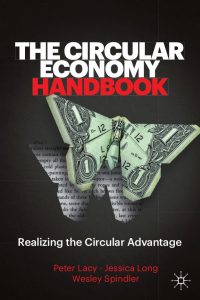At Davos this week, global leaders are talking about the pressing issues of the day. One of the most important is the strategic shift to a circular economy – something Dell sees as an opportunity for innovation, new market development and a more sustainable approach to the future. It is, therefore, both humbling and exciting to be included in the new book, The Circular Economy Handbook, released on January 20 during the World Economic Forum’s annual meeting.
For those not familiar, there are a lot of models and theories on what the circular economy is. I prefer a simpler explanation that starts with its opposite: the linear economy.
In a linear economy, manufacturers take resources, make products, and then consumers throw them away. It’s a one-way conveyor belt. In a circular economy, manufacturers reuse the resources they already have: products get recycled and they use the recycled material or other renewable resources to make new products. They also look for ways to create value without creating more stuff at all.
So what is all the excitement about? The new handbook is a follow up to Waste to Wealth, also published by Accenture under Peter Lacy’s guidance back in 2015. It demonstrated that a shift to the circular economy had the potential to create $4.5 trillion in value by 2030 through the adoption of five key business models: circular supplies, resource recovery, product life extension, sharing platforms, and product-as-a-service.
At that time (also during the World Economic Forum), Dell was awarded the inaugural Accenture Award for Circular Economy Pioneers. They recognized us for our work developing a closed-loop process for recycling plastics from old computers back into new ones. This was on top of our existing programs for recycling and using recycled-content materials, as well as finding innovative new materials for our packaging. We were engaging some of those circular business models, if even just in a basic way.
 Now, five years later, I am very proud that Dell is recognized multiple times within the handbook for our vision, our creativity in product circularity, our contributions to thought leadership and as a case study for the way we bring the power of multiple circular business models together.
Now, five years later, I am very proud that Dell is recognized multiple times within the handbook for our vision, our creativity in product circularity, our contributions to thought leadership and as a case study for the way we bring the power of multiple circular business models together.
Maybe more exciting for me, however, is where the future can take us. Last fall, we set our most ambitious goals ever in this realm as part of our Progress Made Real Social Impact Plan for 2030. By 2030, for every product a customer buys, we will reuse or recycle an equivalent product. 100% of our packaging will be made from recycled or renewable material. More than half of our product content will be made from recycled or renewable material.
Success will require ingenuity, further research and development, and continued strong partnerships with our customers, suppliers, academics and the nonprofit community.
The payoff is worth it. The social and environmental pressures the world is facing are daunting, but as the authors make clear in The Circular Economy Handbook, circularity offers an alternative. It has the potential to give organizations a competitive advantage while helping society address those challenges in a positive way.
The Circular Economy Handbook: Realizing the Circular Advantage is available at Amazon. Learn more about Dell’s approach to the circular economy here.